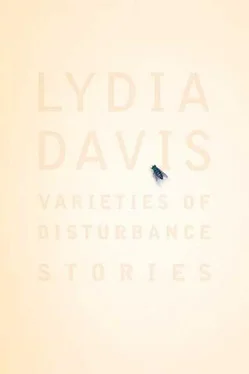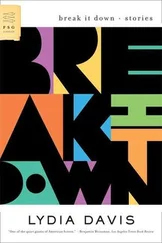They had said that the bus with “Cleveland” on the front would be the right bus, even though I wasn’t going to Cleveland.
2.
The backpack I had brought with me for this was a very sturdy one. It was even stronger than it needed to be.
I practiced many answers to their possible question about what I was carrying in my backpack. I was going to say, “It is sand for potting plants” or “It is for an aromatherapy cushion.” I would also have told the truth. But they did not search the luggage this time.
3.
In my rolling suitcase I had the metal container, well wrapped in clothes. That was now her home, or her bed.
I had not wanted to put her in the rolling suitcase. I thought that riding on my back she would at least be near my head.
4.
We waited for the bus. I ate an apple so old it was nearly baked like a pie apple.
I don’t know if she, too, heard and was bothered by the recorded announcement. It came over the loudspeaker every few minutes. The bad grammar in the beginning is what would have bothered her: “Due to security reasons…”
5.
Leaving the city felt so final that I thought for a moment my money wouldn’t be good where we were going.
Before, she could not leave her house. Now she is moving.
6.
It has been so long since she and I traveled together.
There are so many places we could go.
Christian, I’m not a
This is my husband, and this tall woman with him in the doorway is his new wife. But if he is silly with his new wife, and younger, then I become older, and he is also my son, though he once was older than I, and was my brother, in a smaller family. She, being younger even than he, is now a daughter to me, or a daughter-in-law, though she is taller than I. But if she is smarter than a young woman, and wiser, she is no longer so young, and if wiser than I, she is my older sister, so that he, if still my son, must be her nephew. But if he, very tall though she even taller, has a child who is also my child, am I then not only a mother but also a grandmother and she a great-aunt, if my sister, or an aunt, if my daughter? And has my son then run off with his child’s aunt or, worse, his own?
Example of the Continuing Past Tense in a Hotel Room
Your housekeeper has been Shelly.
I listen to the different boats’ horns, hoping to learn what kind of boat I’m hearing and what the signal means: is the boat leaving or entering the harbor; is it the ferry, or a whale-watching boat, or a fishing boat? At 5:33 p.m. there is a blast of two deep, resonant notes a major third apart. On another day there is the same blast at 12:54 p.m. On another, at exactly 8:00 a.m.
The boats seem to come and go at all hours, and last night I could still hear their engines sounding well into the early morning. The pier is so far away, though, that the boats are the size of dominoes and their engines can be heard only when the town is quiet.
I am staying by the harbor in a damp little blue-and-white room that smells faintly of gas from the stove. The only people I see are an old couple who live just outside town. Sometimes they have visitors as old as they are, and then they invite me to have dinner or tea with them.
I work in the mornings and early afternoon, then I go out to get my mail. If I shop, I might buy a pencil sharpener, a folder, some paper, and a postcard. Another day, I might buy some fruit, some crackers, and a newspaper.
It is the beginning of August. I am not sure I should stay for the whole month. This may be a good place to work. My neighbors are quiet and I do not even have a telephone. Still, I’m not sure. I am trying to plan out how it would be. I can work most of the day. I can visit the two old people. I can write many letters. I can walk to the library. I can swim. What is missing?
A storm is coming, and the gulls cry over the streets. They have come over the land away from the storm. There is a heavy smell of fish in the air.
A short gust of wind, then calm, then the sea is dark gray and the rain comes down hard, and the wind blows against the awnings. My neighbor in the room above goes to his door, then begins walking around over my head.
To get to the beach from my room I go down the narrow boardwalk between two wooden buildings, mine and the motel next door. The two buildings lean together above me as I pass the windows of the motel apartments, waist high; at certain hours women are working in the kitchens, and there are snatches of conversations in the living rooms. These people seem louder and at the same time more stationary because they are idle and on vacation.
The different groups of people here: the year-round residents, who are sometimes artists and often shop owners; the tourists, who come in couples and families and are generally large, young, healthy, tanned, and polite; of these tourists, most are American, but some are French Canadian, and of these, some do not speak English; Portuguese fishermen, but they are harder to discover; some Portuguese who are not fishermen but whose fathers or grandfathers were fishermen; some fishermen who are not Portuguese.
I looked at whale jawbones in the museum this morning. Then I did some shopping. Whenever I go into the drugstore it seems that many people are buying condoms and motion sickness medicine.
Fog comes in over the next hill, foghorns sound, now and then boats whistle. Waves of mist blow like curtains, or smoke.
The noises here at different times of day: At 5:00 a.m., when sunlight pours into this room, there is relative quiet that continues until after 8:30. Then there is increasing noise from the street: after 10:00 a.m., a gentle Central American music, constant, inoffensive plucking and pinging, as well as the sound of passing cars, voices in conversation, the clatter of silverware from an upstairs terrace restaurant across the street, car engines turning over in the parking lot to one side of my room, people calling out to each other, laughing and talking, and all of this then continues through the day and the evening and past midnight.
I will probably not think about the whale jawbones once I am home again. I have noticed that it is only when I am at the seaside, for one short period of the year, though not every year, that the things of the sea become interesting to me — the shells, the creatures, even the seaweed; the boats and how they are built and what their functions are; and nautical history, including the history of whaling. Then, when my visit is over, I go away and I don’t think about them.
For two days I did not speak to anyone, except to ask for my mail at the post office and say hello to the friendly checkout woman at the small supermarket.
When the storm began today I heard the footsteps of the man who lives above me going across to the door that leads out to his deck, pausing there for a while, and coming away again. The ceiling is low, and the sound of these footsteps is a very loud crunch, so that I feel they are almost on my head. When he comes home, first I hear the clanging of the street gate, then his brisk steps down the concrete walk of the alley, then the hollow wooden clatter as he climbs the stairs inside the building, then the loud crunch over my head. Steps in one direction, steps in another, then steps crisscrossing over my ceiling. Then there is silence — he may be reading or lying down. I know he also paints and sculpts, and when I hear the radio going I think that is what he is doing.
He is a friendly man in late middle age with a loyal group of friends. I discovered this one of the first nights I was here. He had been away in the city for a few days celebrating his aunt’s hundredth birthday, as I heard him tell his friends, and was loudly welcomed back by a hoarse-voiced, middle-aged woman trailing a string of other people standing outside our building in the alley. They had come by to see if he was back. I know he is friendly because of a smile and greeting he gave me on his way into the building once, a greeting that lifted my spirits.
Читать дальше












